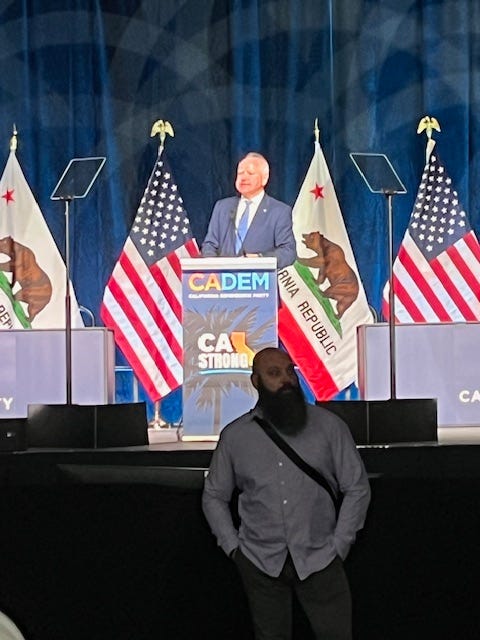Back in March, I was elected as a delegate to the state Democratic Party convention. I ran at the request of an acquaintance who knew me from my work on the Oakland Police Commission and the Oakland Tech PTSA Board. As you can see from that brief resume, I am reasonably accustomed to stultifying parliamentarianism and policy differences that dance on the head of a pin. I didn’t know what to expect at the convention, but I figured I would find it to be an interesting learning experience and hoped I would be able to contribute in some way.
I won’t bury the lede. I didn’t learn much and I wasn’t asked to contribute anything. Not even money, really. The CA Democratic Party (CADEM) has a modest fundraising campaign called, ahem, CADEM, where DEM stands for Donate Every Month. They are asking for $7 per month. That’s essentially a large coffee, and they’re sensitive to the fact that they are ostensibly the party of the working class. So far so good, right? But the only way I knew about this fundraising push was because there was a table in the “exhibit hall” and a flyer in my canvas tote. No one asked me to donate in any forum I attended.
A pillar of organizing is to always have an “ask” or a “call to action.” The asks can be minimal: sign a petition, donate $7, post on social media. Each ask should lead to a bigger ask: have your friends sign the petition, donate $250, host a fundraiser. And so forth. I didn’t hear a single “call to action.” I heard platitudes and bluster and “Is Labor in the house? I said IS LABOR IN THE HOUSE??” So many “When We Fight We Win” call-and-responses and so few clues about how we are going to win back the House in 2026 or what the Democratic platform is going to be.
Let me back up and say that this was the state party reorganizational meeting, meaning that it was an opportunity to elect new officers and possibly review rule changes. The election was held on Saturday and it was such a foregone conclusion that the state chair Rusty Hicks did not even bother to use his candidate time to re-introduce himself. Instead, he sent three women of color (he’s a white dude) onto the stage to gush about him and his leadership.
It’s true that the Democrats in CA were able to flip three GOP seats in 2024. That success has largely been attributed to efforts by the state labor federation to get out their members to vote without referring the Democratic Party. In other words, the Dems only won when voters didn’t realize the candidates were Dems. Not exactly a resounding victory or long-term strategy.
Democrats hold every statewide elected office and have a supermajority in the state legislature. While those policy differences may surface occasionally - there’s a intraparty tussle about reforming the California Environmental Quality Act (CEQA) right now - it means that people in power who know how to operate those levers of power are rarely challenged or held accountable, and it shows. I felt like there was arrogance afoot at the state party but I didn’t feel urgency or anger, at least from the people responsible for organizing for the generational change we need.
A quick caveat: Tim Walz said all the right things. Which was great and motivational, but also offered such an obvious contrast to the rest of the Democratic party that it was a little embarrassing for the rest of the party.
What would I have liked to see from the party leadership at the Convention? Here are a few ideas:
Either strategy sessions to collect ideas and feedback from local activists about how to best organize Democrats in their counties or an existing strategy for the 2026 midterms that actively incorporated the commitments of local activists to implement that strategy.
All of the House of Representative members who face tight battles in 2026, rather than just the three flipped seat Reps (Dave Min, George Whitesides, and Derek Tran). All of the threatened members should be actively enlisting volunteers NOW.
A dialogue about how to best communicate with Democratic voters through the year, rather than in the months before an election, including a discussion about getting text-based fundraising under control. Maybe a call for CA Dems to stop flogging the shit out of every donor list they can get their hands on? Set an example for the rest of the country.
More advanced organizer trainings than just for new activists. Maybe some engagement that is profession-specific, like training teachers to advocate for education, public sector workers to advocate for public services, etc., etc. Stop expecting leadership to speak on every topic and enlist frontline activists to be our spokespeople.
All of these ideas require the state party leadership and state Dems to stop gatekeeping and to empower Dem activists at the expense of their own influence. So I’m not going to hold my breath. But I do think we are wasting a supermajority when the majority of activists and voters are not engaged year-round.




